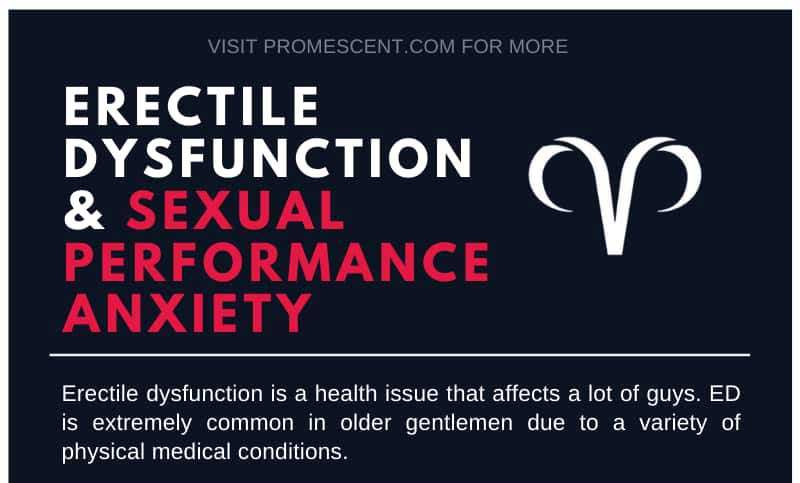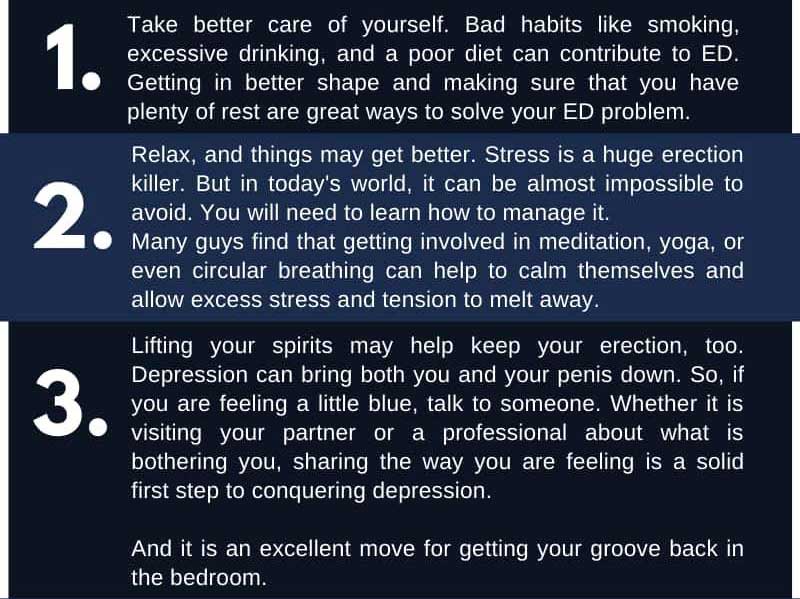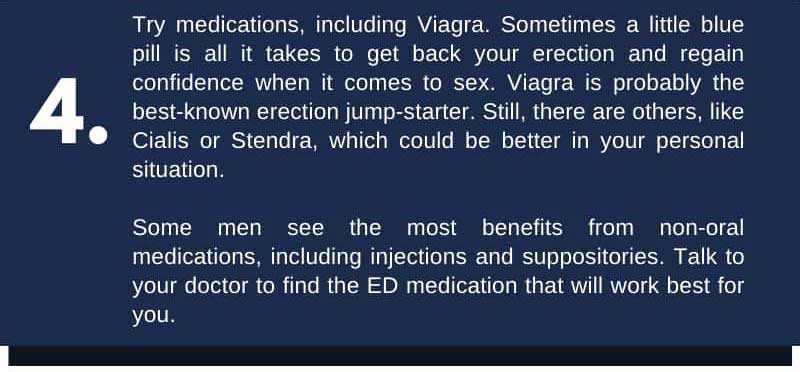Sexual peformance anxiety and erectile dysfunction are more linked together than most realize. Learn how to overcome sexual performance anxiety and have better sex.

2,895 reviews


2,895 reviews

Ideally, sex should be a way to release stress and tension—it shouldn’t be a source of it.
Unfortunately, however, for some guys, sex causes them nothing but worry. This worry leads to sexual performance anxiety, which leads to erectile dysfunction.
Men who suffer the worst of these sex-related issues sometimes resort to avoiding sexual encounters altogether.
Fortunately, there are coping strategies that can help with ED and other problems caused by sexual performance anxiety (SPA).
Yes, performance anxiety can lead to quicker than normal ejaculation times. High levels of anxiety can also lead to issues gaining and maintaining erections too.
Understanding your body is important. When you feel aroused your heart rate increases. Learn to control your breathing and relax your body to avoid over-excitement. Focus more on your partner and their needs rather than your own.
Some of the leading causes of sexual anxiety stem from a low self-image, lack of confidence, lack of experience, or fear of the inability to satisfy your partner.
Psychogenic erectile dysfunction occurs when one can't maintain an erection due to psychologic or interpersonal factors.
Research from the International Society of Impotence Research has shown that anxiety of any kind, including sexual performance anxiety, can be a cause of erectile dysfunction.
It can potentially spill over and lead to other problems such as:
In fact, research shows that performance anxiety is an important risk factor in developing acquired PE.
So what may initially start out as a minor anxiety issue may become a bigger problem.
Let's take a look at how sexual performance anxiety often starts.

Sexual performance anxiety is mainly caused by being too stressed out and worried for your body to get excited. Common worries include:
Let's dive deeper into some of these issues to better understand.
People want to feel good about themselves. Yet, all of us have certain aspects of ourselves, especially our bodies, that we don't particularly like.
Lots of guys fear that by being intimate with another person, they may expose some of these flaws and, ultimately, experience rejection.
Typically, guys have the most concerns about their weight and muscle mass, as well as their penis size and appearance.
Guys judge themselves pretty harshly when their penises don’t work the way the want them to.
Will it get hard enough? Will I climax too early? And will I be able to reach orgasm at all?
These are all questions that many guys grapple with going into a sexual encounter, especially if they’ve experienced sexual difficulties in the past.
These uncertainties can weigh heavily on your mind and contribute to sexual performance anxiety, leading to more severe issues over time, especially if you find yourself preoccupied with them during sex itself.
Even for guys with the most active sex lives, intercourse itself makes up only a tiny fraction of the daily interactions they have with their lover.
There’s a heck of a lot more to a relationship than sex, and the overall quality of your relationship has important implications for your sex life.
Indeed, a poor relationship outside the bedroom can increase sexual performance anxiety between the sheets.
Men who have trouble communicating openly and honestly with their significant other often fall into this category.
New and different things can potentially be scary and stressful, and not all of us deal equally well with this. That is true for life in general, but also when it comes to sex.
Guys who don't have much experience with sex and those who are expanding their horizons by trying new and different sexual activities are likely to encounter more sexual performance anxiety.
However, feelings of uneasiness can quickly overcome even a very skilled lover when he is getting physical with a brand new partner, especially if he starts worrying about how he looks or how he’s performing.
Whether you are having sex with someone for the first time, or with your spouse of ten years, concerns about pleasing and pleasuring your lover have the potential to rattle your nerves.
This is particularly true immediately following a sex session that did not work out as well as you might have liked.
Perhaps you feel your own performance fell short or your partner did not seem fully content.
Whatever is causing you to feel intimidated when it comes to having sex, it’s important to know that sexual performance anxiety solutions exist and that, yes, you can learn to enjoy having sex again.

Sexual performance anxiety does not have to be a lifelong issue. Here are four simple tips that can help you get past the thoughts that are screwing up your sex life. You can get back in bed with more confidence than ever before.
If your penis works when you masturbate, you know your equipment is working from a physical perspective. However, if you’re also having the same problems during masturbation, that may be the sign of a more serious issue that requires medical treatment.
Understanding your sexual response by practicing when you are by yourself is a good way to reinforce that there is nothing wrong with you and can help you start to build up your confidence.
Try to clear your head of those concerns that something won't work perfectly.
Is your sexual performance anxiety because you're fearful that your penis won't rise to the occasion. Or that you might orgasm too quickly or not at all?
Pro Tip: Try the 1# doctor recommended desensitizing spray for premature ejaculation from Promescent.
Stop stressing out about those kinds of thoughts and recognize that whatever does or doesn’t happen is okay. It’s perfectly normal for penises to not always work the way we want them.
When this happens, don’t let it get to you. It doesn’t mean there’s anything wrong with you, or with your relationship, so stop heaping so much pressure on yourself to achieve sexual perfection. Seeking perfection is an unrealistic and unproductive way to approach sex.
Shifting the focus off of evaluating your performance and onto enjoying the sensations you’re experiencing is one of the keys to great sex.
Live in the moment and think about the journey as a whole instead of mentally fixating on one destination: orgasm.
Try to be present at every stage of the process from foreplay to climax and beyond.
If you or your partner get stuck somewhere along the way—for example, perhaps your erection goes away—that’s okay. This doesn’t mean it’s not coming back!
Shift to other activities like kissing and pleasuring your partner and try to clear your head. By tuning back into the physical sensations and tuning out the distracting thoughts, you’ll likely find that you’re “up” again in no time.
And if your erection doesn’t return, you ejaculate early, or you don’t orgasm at all, remember that the experience can still be fun and enjoyable for everyone and that next time can be different.
If you think that every woman should experience orgasm from vaginal penetration each time they have intercourse, think again!
The truth is that not all women climax through vaginal intercourse alone. Only about half of women report that they can even experience orgasm through penile movements in the vagina alone.
However, there are lots of things you can do to increase the odds of your partner orgasming during sex.
According to research, this includes spending more time building up arousal, providing clitoral stimulation during intercourse, not rushing through sex, and trying new and different sexual activities.
In other words, it’s important to avoid going into sex with unrealistic expectations or incorrect beliefs about how the female body works. The more you know, the less worry you’ll likely feel.
All of the above tips are likely to be helpful for men who suffer from mild to moderate sexual performance anxiety.
But what about ways to help the more serious physical problems that often stem from anxiety, such as erectile difficulties and premature ejaculation?
Not to worry—there are things you can do to reduce these symptoms as well.




1. Take better care of yourself.
Lifestyle factors like smoking, excessive drinking, and poor diet can contribute to ED. Cutting back on alcohol and tobacco, getting in better shape—especially by building cardiovascular fitness—and making sure that you get plenty of rest are all, therefore, ways of potentially improving erectile functioning.
In fact, research has shown that lifestyle modifications can actually reverse ED.
As a bonus, improving the way you look can go a long way toward making you feel better about yourself in general. This can lead to a better self-image and can help reduce or eliminate performance anxiety.
2. Relax, and things may get better.
Stress can be a major boner killer. Unfortunately, however, in today's world, it can be almost impossible to avoid stress, so you will need to learn how to manage it.
For example, many guys find that getting involved in meditation, yoga, or even circular breathing is calming—the same goes for practicing mindfulness techniques, which involve learning to be in the moment. Others find working out to be a great stress reliever.
It can also be helpful to establish more work-life balance. Bringing your work home with you can really interfere with an active and satisfying sex life. And when work is constantly on your mind, it can make it more difficult to perform.
3. Don’t let depression go unaddressed.
Depression and other mood disorders often co-occur with sexual performance problems. So if you are feeling depressed, talk to someone. Being in a good headspace is one of the keys to enhanced sexual performance.
However, be aware that if you require clinical treatment for depression, some medications may cause negative sexual side effects, so don’t be afraid to talk to your doctor about how to manage them or to try treatments that won’t interfere with bedroom performance.
4. Talk to your doctor about sexual performance medications, such as Viagra.
Sometimes a little blue pill is all it takes to get your erection back and regain confidence when it comes to sex. Viagra is probably the best-known performance pill; however, there are many others, such as Cialis and Stendra.
There are also other options, including injections and urethral suppositories. Talk to your doctor about finding the right approach for you.
Like erectile dysfunction, premature ejaculation is a very common sexual issue.
Approximately one-third of men under the age of 60 have at least occasional issues with PE. Doctors define early ejaculation as regularly reaching orgasm within one minute after penetration during vaginal sex.
Whether you have chronic symptoms or symptoms that only occur from time to time, PE has the potential to increase the odds of sexual performance anxiety.
As mentioned above, sexual performance anxiety can potentially lead to PE, which can further increase anxiety. It can therefore become a self-fulfilling prophecy. However, there are numerous solutions to help you overcome this issue.
1. Open up about PE.
Premature ejaculation is a problem that causes many men to feel shame—but it shouldn't, and it’s important to talk to your partner about it.
This is particularly important if PE is making you completely avoid sex. Odds are, your partner will be understanding and willing to work with you on ways to address it to ensure everyone is getting the sex they want. Sometimes that bit of reassurance may be all that’s necessary for mild PE to go away, especially if it stems from anxiety.
2. Take the problem into your own hands.
There are a number of manual approaches you can use to reduce the frequency of PE. Two of the best known are the stop-start method and the squeeze technique. Choose one and practice either by yourself or with your partner.
In many cases, these exercises can solve the problem with no additional treatment necessary.
3. Start using a condom or choose a thicker one.
Adding an extra barrier is an easy way to reduce sensitivity and prevent premature ejaculation. Look for condoms that are advertised as "Extra Strength" or "Extra Safe."
If you’re new to using condoms, remember to use lots of lube in order to improve enjoyment and avoid causing pain and irritation.
4. Use a numbing spray or cream.
For immediate relief from premature ejaculation, consider a topical medication to help desensitize your penis.
There are a variety of over-the-counter (OTC) and prescription-only products on the market. For example, one OTC product, Promescent, is recommended by over 2,000 urologists and is well-reviewed by customers.
There are a variety of OTC and prescription-only products on the market. One product, Promescent, is recommended by over 2,000 urologists and is well-reviewed by customers.





Sex should be a fun and enjoyable experience for everyone; however, sexual performance anxiety can really put a damper on sexual pleasure and intimacy.
Overcoming sexual performance anxiety is possible with the help of an understanding partner and a variety of male performance anxiety solutions.
Whether it’s practicing mindfulness exercises, deep breathing techniques, or getting yourself a sexual enhancer like Promescent, there’s probably a great option out there for you.
You may feel all alone on this, but take solace in knowing that most men will experience sexual performance anxiety at some point in their lives, too, and that it can be successfully addressed.
Dr. Justin Lehmiller is a social psychologist and Research Fellow at The Kinsey Institute. He is author of the blog Sex and Psychology and the popular book Tell Me What You Want: The Science of Sexual Desire and How It Can Help You Improve Your Sex Life. He is also a prolific researcher who has published more than 50 academic works, including a textbook titled The Psychology of Human Sexuality that is used in college classrooms around the world. Dr. Lehmiller is one of the media's go-to experts on sex and has been interviewed by The Wall Street Journal, The New York Times, and CNN; he has also appeared on dozens of radio, podcast, and television programs.
Absorption Pharmaceuticals LLC (Promescent) has strict informational citing guidelines and relies on peer-reviewed studies, academic or research institutions, medical associations, and medical experts. We attempt to use primary sources and refrain from using tertiary references and only citing trustworthy sources. Each article is reviewed, written, and updated by Medical Professionals or authoritative Experts in a specific, related field of practice. You can find out more about how we ensure our content is accurate and current by reading our editorial policy.
Chris G. McMahon, Emmanuele A. Jannini, Ege C. Serefoglu, and Wayne J. G. Hellstrom. 2016 August. The pathophysiology of acquired premature ejaculation. NCBI. https://www.ncbi.nlm.nih.gov/pmc/articles/PMC5001985/ Accessed 29 Jan 2022.
Chris G. McMahon, Emmanuele A. Jannini University of Rome Tor Vergata, Ege Can Serefoglu Istanbul Medipol University,
Wayne JG Hellstrom Tulane University Medical Center. 2016 August. The pathophysiology of acquired premature ejaculation. ResearchGate. https://www.researchgate.net/publication/305987630_The_pathophysiology_of_acquired_premature_ejaculation. Accessed 29 Jan 2022.
Justin Lehmiller. 2016 April 24. Infographic: How A Man’s Body Image Affects His Sex Life. Sex & Psychology. https://www.sexandpsychology.com/blog/2016/4/24/infographic-male-body-image-sex-life/. Accessed 30 Jan 2022.
Justin Lehmiller. 2013 September 25. How Men Feel About Their Own Penises (Infographic). Sex & Psychology. https://www.sexandpsychology.com/blog/2013/9/25/how-men-feel-about-their-own-penises-infographic/. Accessed 30 Jan 2022.
Justin Lehmiller. 2017 October 11. Infographic: Women’s Experiences With Orgasm During Vaginal Intercourse. Sex & Psychology. https://www.sexandpsychology.com/blog/2017/10/11/infographic-womens-experiences-with-orgasm-during-vaginal-intercourse/. Accessed 30 Jan 2022.
Ross M Simon, Lauren Howard, Daniel Zapata, Jennifer Frank, Stephen J Freedland, Adriana C Vidal. 2015 May. The association of exercise with both erectile and sexual function in black and white men. PubMed. https://pubmed.ncbi.nlm.nih.gov/25801073/, Accessed 30 Jan 2022.
Urology Care Foundation Staff. 2020 July 16. What is Premature Ejaculation?. Urology Care Foundation. https://www.urologyhealth.org/urology-a-z/p/premature-ejaculation. Accessed 30 Jan 2022.
"Delayed Ejaculation - Men's Clinic." Uclahealth.org, 2023, www.uclahealth.org/medical-services/urology/mens-clinic-ucla/sexual-health/delayed-ejaculation. Accessed on Feb, 23, 2023.
"How Are Porn And Performance Anxiety Related? - Better Help." Betterhelp.com, 2023, www.betterhelp.com/advice/general/how-are-porn-and-performance-anxiety-related/. Accessed on Feb, 23, 2023.
"One Surprising Cause for Male Performance Anxiety - Psychology Today." Psychologytoday.com, 2020, www.psychologytoday.com/us/blog/extraordinary-relationships/202010/one-surprising-cause-male-performance-anxiety. Accessed on Feb, 23, 2023.
Texas A&M University. "Five common causes of erectile dysfunction." ScienceDaily. www.sciencedaily.com/releases/2016/02/160208183449.htm (accessed February 23, 2023).
Rahman Shiri, Juha Koskimäki, Matti Hakama, Jukka Häkkinen, Teuvo L J Tammela, Heini Huhtala, Anssi Auvinen. 2003 December. Prevalence and severity of erectile dysfunction in 50 to 75-year-old Finnish men. PubMed. https://pubmed.ncbi.nlm.nih.gov/14634411/. Accessed 30 Jan 2022.

2,895 reviews
Your Cart Is Empty

$19.95

$14.95

$19.95